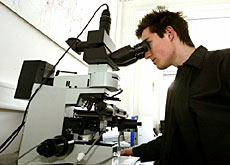Bologna reforms begin to bite

Europe-wide higher education reforms are taking effect in Switzerland, with the first batch of students having completed a three-year Bachelor’s degree.
The majority are continuing their studies to Master’s level, according to the Federal Statistics Office on Tuesday.
Under the European Union’s Bologna Declaration of 1999, 40 countries – including Switzerland – agreed to harmonise higher education across the continent and to encourage students to study in other countries.
The aim is the creation of a European Higher Education Area by 2010.
The reforms brought in a two-stage university education, under which students receive a Bachelor’s degree after three years of study, and a Master’s after a further two to three years.
The first Bachelor’s courses under the new system were introduced in the winter of 2001/2002. The universities awarded 1,057 Bachelor’s degrees in 2004, mainly to students of economics and law.
Studies continue
Almost nine out of ten students who obtained a Bachelor’s degree – 88 per cent – have chosen to continue their studies. The rate of those continuing to a Master’s degree is almost 100 per cent in the case of law students, while eight out of ten economics students are carrying on.
The number of students beginning studies leading to a Bachelor’s or Master’s degree has practically doubled since last year, according to the office.
There are currently 22,000 people studying for a Bachelor’s degree in Switzerland, 4,000 aiming for a Master’s degree and 63,000 opting for another qualification, such as diploma.
Economics, technical sciences and applied sciences are the areas in which the introduction of the Bologna reforms is the most advanced.
The change is not so marked yet in human and social sciences, where only 18 per cent of students are starting a Bachelor’s course.
Caution
But the statistics office says the figures have to be interpreted with caution because almost half of those obtaining Bachelor’s degrees began their studies under the old system.
Specialised technical colleges will offer courses taking into account the Bologna reforms from this autumn.
There were 160,000 students enrolled in Swiss higher education establishments for the winter term, which is 7,000 or 4.7 per cent more than the previous year.
The number of students in universities remained stable at 111,000 in 2004/05.
Lucerne University is continuing to expand with 350 more students (+31 per cent) after the opening of a law faculty in 2001 and an expanded social sciences department.
At other universities expansion is more modest, with six per cent growth in student numbers in Basel, Bern and Italian-speaking Switzerland. St Gallen University has six per cent fewer students.
swissinfo with agencies
The Bologna Declaration, which involves 40 countries, includes calls for:
A two-stage approach to higher education.
Academic grades which are easy to compare.
Mobility of students, teachers and researchers.
Cooperation concerning quality assurance.
The next step in the process is a ministerial meeting in Bergen, Norway in November.
The Bologna Declaration of 1999 foresees the creation of a European Higher Education Area by 2010.
The new university courses are in two stages: three years for a Bachelor’s degree and two additional years for a Master’s degree.
In Switzerland the first such courses were introduced in 2001/2002, with the first “Bologna” degrees awarded in 2004.
Last year, the universities awarded 1,057 Bachelor’s degrees, according to the Federal Statistics Office.

In compliance with the JTI standards
More: SWI swissinfo.ch certified by the Journalism Trust Initiative










You can find an overview of ongoing debates with our journalists here . Please join us!
If you want to start a conversation about a topic raised in this article or want to report factual errors, email us at english@swissinfo.ch.